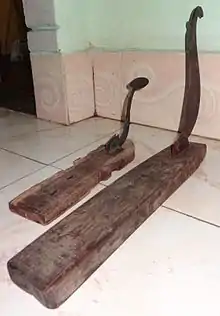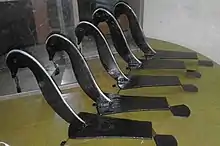Boti
Boti, Dao, Da, Chulesi, or Pirdai (Bengali: বঁটি ; also transliterated Bonti or Bnoti or Nepali : चुलेसी; Chulesi) is a cutting instrument,[1] most prevalent in the country Nepal and Bengal region,[2] a region in eastern part of the Indian subcontinent,[2] which is now divided between the Indian states of West Bengal, Tripura, and Barak Valley of Assam and the independent country of Bangladesh .

A boti is a long curved blade that cuts on a platform held down by foot. Both hands are used to hold whatever is being cut and move it against the blade. The sharper side faces the user.[3] The method gives excellent control over the cutting process and can be used to cut anything from tiny shrimp to large pumpkins.
Variations
A larger version of the boti, with a bigger blade, is used for gutting and cutting fish. Another version of the boti comprises the Narkel Kuruni (coconut grater) in the form of a flat round top with sharp small shark-like teeth all around it to serrate coconut. Dao or daa (a more prevalent name in Bangladesh, specifically Chittagong and Sylhet) is a variation of boti, which is handheld.
The cutting instrument is not unique to Bengal. It is well known in Maharashtra and South India also. The names in South India are in Tamil: Arivalmanai or Aruvamanai, Telugu: Kathipeeta, Konkani: Addili, Marathi: Vili or Morli, Odiya: Panikhi, Bihar: Pirdai etc. It is known as Chulesi in Nepal(चुलेसी) and used to chop vegetables mainly in the rural areas of Nepal.
It is basically for the cooks to sit comfortably on the floor and cut vegetables and meat with one leg folded on the wooden base and the other leg stretched. The coconut scraper is in all states mentioned above who produce and use more coconuts in the cuisine.

References
- Chitrita, Banerji (Spring 2001). "The Bengali Bonti". Gastronomica. 1 (2): 23-26. doi:10.1525/gfc.2001.1.2.23.
- M Dasgupta (14 October 2000). Calcutta Cookbook: A Treasury of Recipes From Pavement to Place. Penguin Books Limited. pp. 39–. ISBN 978-93-5118-149-1.
- WildFilmsIndia (2015-02-19), Women cutting vegetables at a Bengali wedding - India, retrieved 2017-07-26
